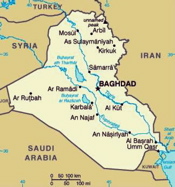The conventional wisdom among neoconservatives who advocated an invasion of Iraq is that Bush administration incompetence explains what has gone wrong. The problem, they say, lies in the execution of what they still maintain was a noble idea: that invading Iraq would put anti-American forces in the Middle East on the defensive and initiate the spread of democracy through the enhancement of U.S. dominance of the region. This collective washing of hands culminated in a series of interviews with well-known neoconservatives in the January 2007 issue of Vanity Fair. Those interviewed pointed towards the Bush administration's operational mistakes and bureaucratic dysfunction to explain why things went awry. More troops were needed, argued some. Returning Iraqi exiles, presumably such as Ahmad Chalabi, should have been handed power straight away, argued others. While it is convenient to lay blame entirely on the Bush administration's implementation of its Iraq policy, it is disingenuous to try to make such a clean distinction between an idea and its execution. There was incompetence, and miscalculations have been made. This is well documented -- but none of it happened in a vacuum. The miscalculations were the product of a conceptual failure about how the Middle East's political landscape could be altered by the projection of military force to serve U.S. interests in the region. The conceptual failure was rooted in false assumptions and a lack of understanding about the region itself.
After 9/11, the Bush administration warmed to the worldview espoused by neoconservatives that projecting military power into the heart of the Arab world was needed to reassert U.S. dominance, beginning with an invasion of Iraq. With Saddam Hussein overthrown, America's other enemies -- primarily the regimes that ruled Iran and Syria as well as non-state actors such as al-Qaida, Hamas, and Hezbollah -- would be severely weakened or perhaps even eliminated. A new order would emerge out of the subsequent political vacuum, characterized by the empowerment of a pro-American democratic polity willing to cooperate with U.S. strategic interests.
Conceptual Failure: Neoconservatism, Iraq and the Middle East

